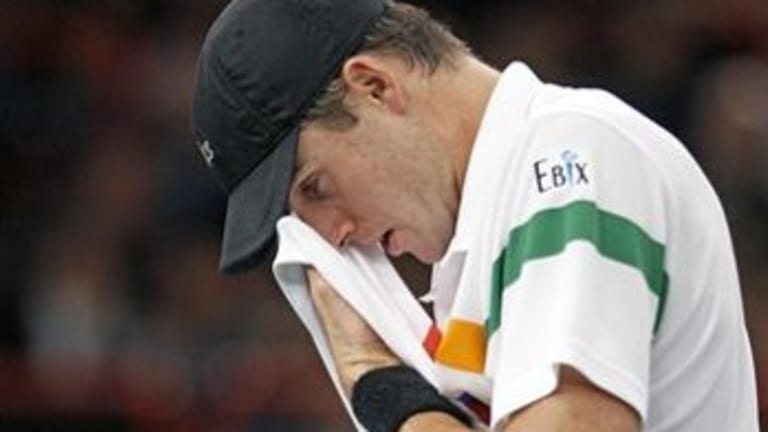This week's Reading the Readers; it might be the year's last. If you have a question or comment for this column, please email me at stignor@tennismagazine.com.
Reading the Readers: December 3
By Steve Tignor Dec 03, 2012WTA Stuttgart, Germany
Iga Swiatek slides through clay-court opener, defeats Elise Mertens in Stuttgart
By David Kane Apr 18, 2024WTA Stuttgart, Germany
Elena Rybakina, Marketa Vondrousova into Stuttgart quarters, Ons Jabeur out
By Associated Press Apr 18, 2024ATP Munich, Germany
Holger Rune makes it through rain, snow, hail, Galán in Munich return
By David Kane Apr 18, 2024Stat of the Day
Casper Ruud has now won more matches than anyone this year after latest win in Barcelona
By John Berkok Apr 18, 2024Style Points
As inseams get higher, Aryna Sabalenka, Stefanos Tsitsipas lead the Great Shorts Debate 🩳
By David Kane Apr 18, 2024ATP Barcelona, Spain
Cameron Norrie clinches 200th match win by halting Roberto Bautista Agut in Barcelona
By TENNIS.com Apr 18, 2024Travel
Destination Tennis: USTA National Campus
By Megan Fernandez Apr 18, 2024Davis Cup
Italy starting Davis Cup title defense against Brazil and US plays Chile
By Associated Press Apr 18, 2024WTA Stuttgart, Germany
Coco Gauff reaches Stuttgart quarterfinals with win over Sachia Vickery, Sabalenka also advances
By Associated Press Apr 17, 2024
© AP
Advertising
Steve, we know who the players of the year are, but why don’t you have a category for Overhyped Player of the Year? Maybe that’s because it would be John Isner, and it would make you American journos look bad for saying he would win the French Open. What is it with Isner that makes you guys overrate him, the same way did with Mardy Fish last year? I wonder...—Matthew
Isner-hate, or at least Isner-aversion, has been one of the stranger sub-themes of 2012 around here. I can see not loving to watch him play, and especially not loving to watch him play 18-16, let alone 70-68, fifth sets. But I’ve been surprised by how little respect his game gets, to the point where his detractors don’t like to hear anything positive said about him. It’s even worse, of course, when those positive words come from an American writer, who is obviously “hyping” him, because...because...well, because that’s what American writers do (never mind why we would bother, or what we would get out of it).
It’s true that Isner turned out to be one of the season’s disappointments, particularly through the all-important summer months. His performances at the last three Grand Slams were awful, and they were likely the catalyst for him parting ways with coach Craig Boynton last week. Boynton stated the obvious to my colleague Matt Cronin on this site: Isner has to return serve better and avoid long matches early at the majors. He also said that John gets too down when he doesn’t return decently, unlike his fellow big server Pete Sampras, who waited patiently for that one break per set and didn’t let a few bad return games bother him. Whatever changes he makes with new coach Mike Sell, three-out-of-five will never be Isner’s forte.
Still, Isner did have a big start to the year, beating Federer and Djokovic, making the Indian Wells final, cracking the Top 10 for the first time, and beating Tsonga to send the U.S. to the Davis Cup semis. There would have been optimism about the future of any player, no matter what country he was from, who did all of those things over the course of five months (though no one that I read picked him to win the French). Now we know that even a few big Isner wins don’t mean he’s going to keep that level up forever, or even for very long. Boynton seemed to understand Isner’s problems; maybe Sell will be able to figure out how he can overcome them.
As far as American writers hyping their countrymen, it is true that a journalist for, say, USA Today or the New York Times will cover U.S. players, because that’s who will be of interest to their readers—i.e., general sports fans in this country. The same is true for writers from every nation. British journalists root openly for Andy Murray; the Swiss support Roger Federer. I don’t mind that, and I understand that a Murray win means that more eyeballs will be on their stories. But I’ve never felt that way while watching U.S. players, in part because my job isn’t like that.
TENNIS.com is based in New York, but it has a substantial international audience. That means I get to write about players from all over, without ignoring developments among the Americans. Which suits me, because I’ve always been a fan of the game as a whole, rather than of the American game in particular. I don’t love hearing about the U.S.’s decline over and over, but I don’t have a stake in this country’s players succeeding, either. I was happy for the U.S. Davis Cup team when they won in 2007, but no happier than I was for the Serbs in 2010 or the Czechs this year.
You might think I hyped Isner because I’m American; I did, mistakenly, pick him to make the U.S. Open semis, because I thought he had a good draw. But I also picked Tomas Berdych, just as mistakenly, to win the bronze medal at the Olympics. Was I “hyping” an overrated Berdych, who went out in the first round? You might have reason for suspicion, Matthew. I did once spend a week in Prague.
Steve, you mentioned a “character study” of Federer, Djokovic, and Nadal last week. Did you see that there was another one on Roger in the New Statesman in England? The writer says Federer should “shun his moral compass” and act badly. We’re too worried about athletes being nice. Did you read it, and what did you think?—Wendi Pardoe
I did read it—"Why Must Our Sporting Idols Be Nice?” by Cameron Sharpe
It’s something of an odd piece, in that Sharpe tells us that Federer hasn’t been perfect over the years, but that he might want to be even less perfect going forward.
I’m not against bad behavior among athletes, within limits. Would the Davis Cup final have been more entertaining without Berdych’s trash talk? I don’t think so. And a lot of tennis discussion these days boils down to, "my favorite player is classier than your favorite player," which gets old fast. But in Federer’s case, one of the reasons for his great success has been his ability to tame the wilder emotions, the moodiness, the bad side, of his youth. I don’t think his game would be helped by letting more of that out, even if he did, as Sharpe says, “relish the freedom.”
Beyond that, as Sharpe himself notes, it’s not like Federer has kept everything bottled up, à la Bjorn Borg. He has been a good representative for the sport, while not hiding some roughness around the edges. He has smashed his racquet, sworn at a chair umpire, been less-than-complimentary to opponents, flashed annoyance at pressers, and told members of an adoring French crowd to "shut up." In other words, he’s been human all along, and pretty honest in his reactions as far as I can tell. Acting intentionally worse would only be that, an act.
Advertising

Reading the Readers: December 3
Don’t you miss tennis yet? Any recommendations for what to do with my extra time in the off-season?—Staring into Space
No, I have to say I don’t miss it, and I won’t miss it. But tennis isn’t just pleasure or recreation for me, it’s my job. Do you miss your job when you’re on vacation? I hope not. But I will welcome it back in January.
As for time-killing recommendations, I saw Argo, which was fair, and Arbitrage and Lincoln, both of which were excellent. I’ve caught up on Homeland, which I like a lot—TV has never been better, has it? I saw two exhibitions at the Whitney in Manhattan recently, but I was more awed by the building that housed them. I've been going there for 20 years, but for some reason I had never noticed that the museum, designed by Marcel Breuer, is such a work of art in itself. (That's the lobby above. The Whitney is moving to a new building downtown soon; thankfully, the Met will take over the Breuer.)
I’m also about to launch into a serious, perhaps even fatal, reading project: the 800-page Mason & Dixon by Thomas Pynchon. I’ve had the book for years, but never got past the first sentence, which is 11 lines long. My favorite of his was V—most of the time I had no idea what was going on, but every so often there’d be a page or two of some of the best writing I’d ever read in my life. I’m hoping for more of the latter in this one. However good or bad it is, I'm sure it will take up plenty of my time. Who knows, 500 pages in, I might miss tennis after all.